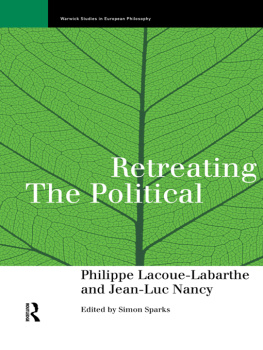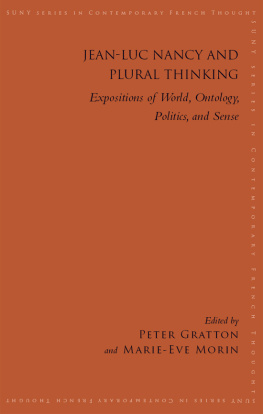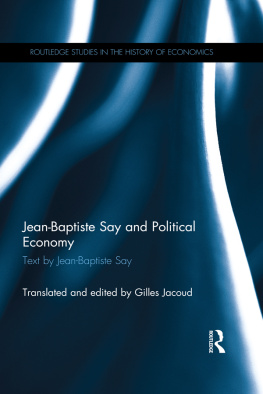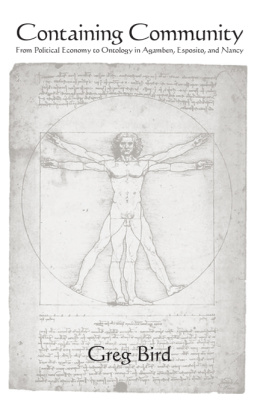Nancy Jean-Luc - Retreating the Political
Here you can read online Nancy Jean-Luc - Retreating the Political full text of the book (entire story) in english for free. Download pdf and epub, get meaning, cover and reviews about this ebook. City: London;Birmingham;AL;USA, year: 1997;1996, publisher: Routledge EBSCO Industries Inc, genre: Religion. Description of the work, (preface) as well as reviews are available. Best literature library LitArk.com created for fans of good reading and offers a wide selection of genres:
Romance novel
Science fiction
Adventure
Detective
Science
History
Home and family
Prose
Art
Politics
Computer
Non-fiction
Religion
Business
Children
Humor
Choose a favorite category and find really read worthwhile books. Enjoy immersion in the world of imagination, feel the emotions of the characters or learn something new for yourself, make an fascinating discovery.
- Book:Retreating the Political
- Author:
- Publisher:Routledge EBSCO Industries Inc
- Genre:
- Year:1997;1996
- City:London;Birmingham;AL;USA
- Rating:4 / 5
- Favourites:Add to favourites
- Your mark:
- 80
- 1
- 2
- 3
- 4
- 5
Retreating the Political: summary, description and annotation
We offer to read an annotation, description, summary or preface (depends on what the author of the book "Retreating the Political" wrote himself). If you haven't found the necessary information about the book — write in the comments, we will try to find it.
Retreating the Political — read online for free the complete book (whole text) full work
Below is the text of the book, divided by pages. System saving the place of the last page read, allows you to conveniently read the book "Retreating the Political" online for free, without having to search again every time where you left off. Put a bookmark, and you can go to the page where you finished reading at any time.
Font size:
Interval:
Bookmark:

There are several people who must be thanked for their work on this book. Firstly the other translators, Richard Stamp (who also proofread, checked/found references, and so forth), Cline Suprenant, and Leslie Hill (for a last-minute rendition of What is to be Done?), both for providing immaculate texts, and for approving my editorial additions and changes to their faultless efforts. The responsibility for all errors, omissions, etc., lies squarely with the editor.
I would also like to thank Andrew Benjamin for commissioning the volume and supporting my efforts throughout, and Miguel de Beistegui and Leslie Hill for their continual linguistic and philosophical assistance. Emma Davis at Routledge deserves special credit for maintaining her cool in the face of unforeseen delays and my navet vis--vis the workings of publication. This volume could not have been achieved without the additional help of Ian Lyne, Ann-Marie Scanlon, Sean Scanlon and Colin Thomas.
Finallybut, as is always the case with these finallys, most importantly I want to thank Philippe Lacoue-Labarthe and Jean-Luc Nancy for their advice, encouragement and assistance throughout this volumes preparation, and for returning to their earlier work in order to prepare the short texts which conclude it. I hope they like it.
Supplementary Texts
As regards the present volume and, in particular, the question of the relation between the political and the philosphical, the reader might be interested to note the following texts by Lacoue-Labarthe and Nancy, all of which could have beenbut for various reasons were notreprinted here. (It perhaps goes without saying that the problematics broached in Retreating the Political are themselves played out across the whole of Lacoue-Labarthe and Nancys oeuvre .) Each of the following texts engages, more or less explicitly, more or less thematically, with the questions of the retreat and of the political.
Philippe Lacoue-Labarthe, La transcendance finie/t dans la politique: originally published in Philippe Lacoue-Labarthe and Jean-Luc Nancy, eds, Rejouer le politique (Paris: Galile, 1981), pp. 171214. Reprinted in Philippe Lacoue-Labarthe, Limitation des modernes: Typographies II (Paris: Galile, 1986), pp. 13573. Translated by Peter Caws as Transcendence Ends in Politics, in Philippe Lacoue-Labarthe, Typography: Mimesis, Philosophy, Politics (Cambridge, Massachusetts: Harvard University Press, 1989), pp. 267300.
Philippe Lacoue-Labarthe, Potique et politique: reprinted in Philippe Lacoue-Labarthe, Limitation des modernes: Typographies II (Paris: Galile, 1986), pp. 175200.
Philippe Lacoue-Labarthe, La fiction du politique (Paris: Bourgois, 1987). Translated by Chris Turner as Heidegger, Art and Politics (Oxford: Blackwell, 1990).
Philippe Lacoue-Labarthe and Jean-Luc Nancy, Le mythe nazi: originally published in Les mchanismes du fascisme (Strasbourg: Bibliothque de prt du Haut-Rhin, Comit sur lHolocauste, 1981). Reprinted with a preface and revisions as Le mythe nazi (La Tour dAigues: Editions de lAube, 1991). Translated by Brian Holmes as The Nazi Myth, in Critical Inquiry 16, 2 (1990), pp. 291312.
Jean-Luc Nancy, La juridiction du monarque hglien: reprinted in Rejouer le politique (Paris: Galile, 1981), pp. 5190. Translated by Mary Ann Caws and Peter Caws as The Jurisdiction of the Hegelian Monarch, in Social Research 49, 2 (1982), pp. 481516. Reprinted in Jean-Luc Nancy, The Birth to Presence (Stanford, California: Stanford University Press, 1993), pp. 11042.
Jean-Luc Nancy, La communaut dsoeuvre (Paris: Bourgois, 1990; new edn). Partially translated by Peter Conner et al . as Jean-Luc Nancy, The Inoperative Community (Minneapolis: Minnesota University Press, 1991), chs 13. See also Of Being-in-common, translated by James Creech in Miami Theory Collective, eds, Community at Loose Ends (Minneapolis: Minnesota University Press, 1991), pp. 112.
Jean-Luc Nancy, La comparution (politique a venir) (Paris: Bourgois, 1991). Translated by Tracy B.Strong as The Compearance: From the Existence of Communism to the Community of Existence, in Jean-Luc Nancy, Political Theory 20, 3 (1992), pp. 37198.
Jean-Luc Nancy, Politique I, in Jean-Luc Nancy, Le sens du monde (Paris: Galile, 1993), pp. 13947.
Jean-Luc Nancy, De ltre singulier pluriel, in Jean-Luc Nancy, Etre singulier pluriel (Paris: Galile, 1996), pp. 19123.
1. retraiter v. a. Terme dadministration. Mettre a la retraite
2. retraiter v. a. Traiter une seconde fois une matire. Matire retraite par le mme auteur. H. XIIe s. Fait li buens reis de France: se tut ert retrait E de e de l, ni aureit amisti, Th. le Mart. 111. E. Lat. retractare, de re, et tractare
Littr.
Retrace, v. 1697. [-Fr. retracer; see RE-, TRACE v.] 1. trans. To trace back to an origin or source; to track through preceding stages. 2. To trace again with the eyes; to look over again with care or close attention 1726. b. To trace again in memory; to recall 1748. 3. To go back upon (ones steps, way, etc.) 1794. | Retreat, v. late ME. [In XV f. as prec., or (O)Fr. retraiter, with accommodation to the sb.] 1. intr. To withdraw, retire, draw back. b. Of an army or a combatant: To retire before a superior force or after a defeat 1596. c. In pa. pple. with is, was, etc. 1648. d. To recede 1863. 2. trans. To draw or lead back; to remove, take away. Now chiefly in Chess, to move (a piece) back from a forward or threatened position. 1523. b. to diminish, reduce. |
Oxford English Dictionary
Philippe Lacoue-Labarthe and Jean-Luc Nancy
Anyone who describes a panic as one of the plainest functions of the group mind arrives at the paradoxical position that this group mind does away with itself in one of its most striking manifestations.
Freud, Group Psychology and the Analysis of the Ego
If he lives among others of his own species, man is an animal who needs a master But this master will also be an animal who needs a master.
Kant, Idea for a Universal History with a Cosmopolitan Purpose
1 The notes which follow are indeed, discounting the usual formalities, notes . They were taken down in a summary and discontinuous fashion during a teaching project in progress over the last three years, a project which it is out of the question to expound in an article. At the same time, they constitute the first point of reference for a future exploration. If we are provisionally risking them here in this somewhat off-putting form, it is for a political reason: it is today necessary, indeed urgent, to demand a rigorous problematisation of the relation between psychoanalysis and politics. The minimum of rigour henceforth consists in the refusal of a double impasse: that over which psychoanalytic instrumentations stumble when put more or less deliberately at the service of a received political thought (which may range from one communism or another to social democracy), for in this way one merely succeeds in reinforcing the initial problems which had to be explored; and the impasse of the proclamations (oscillating from the anarchist left to the libertarian right) according to which, once the libidinal trap of the political is unveiled, one ought to abandon it to the declining history of its Western delirium, and substitute for it an aesthetic or a moral doctrine. (We will not here go back over the political interestsand on the political interests of psychoanalysisbrought into play in each case.)
In other words, we are refusing the attitudes of theoretical (and practical) panic where, through a narcissistic discourse, everyone protects himself or herself from the feeling of the dissolution of the ties which guaranteed the cohesion of the Western mass.
Font size:
Interval:
Bookmark:
Similar books «Retreating the Political»
Look at similar books to Retreating the Political. We have selected literature similar in name and meaning in the hope of providing readers with more options to find new, interesting, not yet read works.
Discussion, reviews of the book Retreating the Political and just readers' own opinions. Leave your comments, write what you think about the work, its meaning or the main characters. Specify what exactly you liked and what you didn't like, and why you think so.








